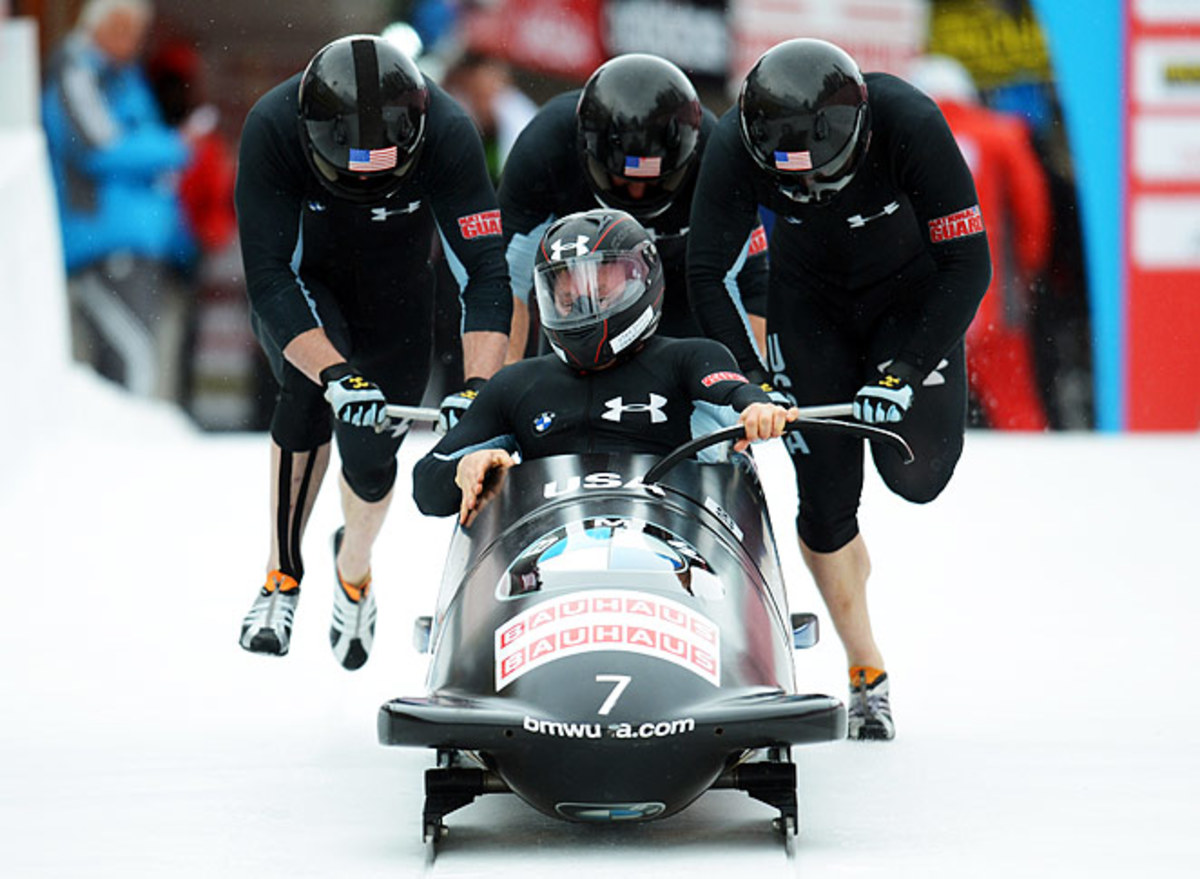One Year Out: U.S. will chase Germans in sliding events in Sochi
Which nation is the best in winter sports? In 2010, the United States led the medal count. But in the three previous Winter Olympics, Germany topped the table. The Germans appear to have a leg up with one year to go until the Sochi Games, and nowhere is that edge more apparent than in the sliding events of bobsled, skeleton and luge.
In Sochi, 27 medals will be awarded in those three sports. Germany is in line to win more than half of them, judging by results over the international World Cup season. They'll be racing at the Sanki Sliding Center just outside Sochi, where speeds were reportedly expected to be about 5 miles per hour slower than the 2010 Whistler track where Georgian luger Nodar Kumaritashvili died in a training run going nearly 90 mph.
"As soon as you pick up a little speed you hit an uphill section that slows you down," said U.S. bobsledder Steve Holcomb, who took his first runs on the Russian track this week.
The U.S. boasts a handful gold-medal contenders, leading with the country's only reigning Olympic champion on a sled. That's Holcomb and the "Night Train" four-man bobsled team that snapped a 62-year U.S. gold-medal drought in the event in Vancouver. Three of the four crew members are back, but Holcomb and Co. are currently decided underdogs. They claimed bronze at the world championships in St. Moritz, Switzerland, on Sunday, and Holcomb hasn't won a World Cup race outside North America since 2009. Germans swept the world titles in the two- and four-man, and Russian Alexander Zubkov, 38, will have home-ice advantage.
"I like to see it as a challenge for me, new territory," Holcomb said. "We are kind of the underdog. People see us as the defending champions, but we have a big hill to climb."
The overriding story in women's bobsled this season has been Lolo Jones' conversion from track and field, but the 30-year-old would not make the Olympic team were it named today. Rather, the U.S. medal focus is on Elana Meyers, who won bronze as a brakewoman in 2010. Meyers, a former softball shortstop at George Washington, moved to the front of the sled after Vancouver and piloted USA-1 to silver at the recent world championships.
GALLERY: Steve Holcomb, Lolo Jones and more U.S. Winter Olympic athletes to watch
Silver may be all Meyers (and the Germans, naturally) can hope for in Sochi. Canada's Kaillie Humphries is arguably the world's most dominant winter sports athlete. She's the reigning Olympic, world and World Cup champion and has won 10 of her last 12 international races dating to January 2012. Humphries was born in 1985 and grew up watching Cool Runnings, the story of the Jamaican bobsled team from the 1988 Calgary Games. Humphries' fulfilled a dream when she won Olympic gold in Vancouver, 400 miles from her hometown.
"The pressure's going to be completely different this time," said Humphries, who celebrated her world title with a four-liter bottle of champagne (not all by herself). "I plan on speaking a lot to [speedskater] Catriona Le May Doan and [rower] Marnie McBean and athletes that have been in that scenario" of defending an Olympic title.
In skeleton, where they slide head first at 80 miles per hour, Latvian brothers Martins and Tomass Dukurs were upstaged by Alexander Tretiakov, the Russian Rocket (apologies, Alex Popov and Pavel Bure), at the world championships in January.
The fastest Americans are women. There's 2011 world champion Katie Uhlaender, a competitive weightlifter who breeds cows.
Teammate Noelle Pikus-Pace, 30, retired after finishing fourth in Vancouver, gave birth to her second child and then came back last year with little expectations. She's surprised herself, medaled in five of six major international races this season and grabbed silver at the world championships. The difference between first and second may have been a matter of a slumber. Pikus-Pace has shared a hotel room with her 1-year-old boy, 5-year-old girl and her husband this season, and the kids didn't sleep very well the night before worlds. She might get her own room in Sochi.
"I feel great, confident, like the results are coming easily," said Pikus-Pace, who trails two Germans in the World Cup standings. "Our goal last Olympics was just to be an Olympian. This time around it's really about getting on a podium."
No American has ever made the Olympic singles luge podium. That likely won't change in Sochi, because of Germany. At last week's world championships, the Germans nearly pulled off a perfect performance: 1-2-3-4 in men's, 1-2-4-5 in women's, 1-2 in doubles and a relay gold. (The relay is a new Olympic event for 2014 where a nation's woman, man and doubles team take runs in succession, the first two tapping a board at the end of their runs to signal the next to go.)
For years, U.S. lugers have been asked what makes the Germans so good. The answer, like the results, hasn't changed.
"If only we knew," said Erin Hamlin, the surprise 2009 world champion who was 12th in 2006 and 16th in 2010. "We've come a long way. We obviously still have quite a long ways to go."






